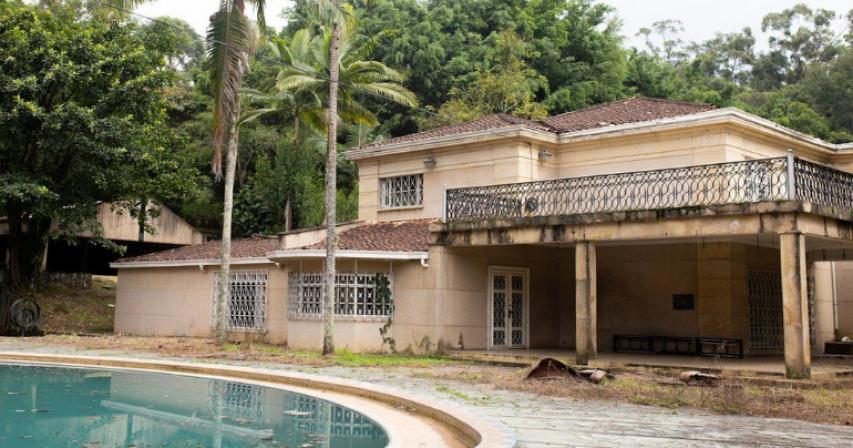The website helping to sell homes with a bloody past
- 4 years ago

The property ads pop up like they would on any other real estate website.
A three-bed, two-bathroom apartment with a turquoise pool for rent on Colombia's Caribbean coast. A four-bedroom, four-bathroom wood-floored house near the jungle-cloaked Panama border. A sprawling Art Deco mansion in the heart of Colombia's second biggest city, Medellín.
There is just one catch: the homes for sale were once owned by former right-wing paramilitaries and left-wing guerrillas of the Revolutionary Armed Forces of Colombia (Farc) who fought each other during Colombia's decades of armed conflict.
In February, Colombia's government launched an online real estate agency, Bienes FRV (Spanish for Real Estate FRV), in an attempt to sell over 1,600 homes, apartments, farms and lots of land which have either been seized by the government or handed over by armed groups that have demobilised over the past years.
The money earned from the properties, estimated to be worth about $140.3m (£100m), will go towards paying reparations to more than seven million victims of the armed conflict.
But while cash and gold handed over as part of the peace process are easy to convert into funds for the victims, some of the houses and apartments have been "impossible" to sell or rent, explains Miguel Avendaño, who heads the reparation fund for Colombia's Victims' Unit.
"The fund needed something like a real estate service," Mr Avendaño said. "We can't just lag behind because there were so few sales and rentals. [Having this service] means more resources for victims."
Since it started putting properties on the market in 2018, the Victims' Unit has only managed to sell 12 properties formerly owned by combatants.
Mr Avendaño explains that the estate agency is an attempt to add transparency to sales while shifting the narrative of the properties away from their bloody past and toward reparations as the country struggles to heal.
Many of the properties are located in rural areas where the conflict still rages five years after Farc guerrillas signed the peace deal with the government.
Others may be in more secure areas but continue to be overshadowed by their violent history, such as Montecasino Mansion, in Medellín.
The marble-lined mansion sits in the heart of the dense, mountainous city, and is up for rent for $4,700 (£3,385) a month. It boasts 12 rooms, 13 bathrooms, a spiral staircase, a lounge bar, a wine cellar, multiple pools and fountains, sprawling gardens and a gold-painted bathtub shaped like a conch shell.
The mansion's previous owners were founders of the now-demobilised right-wing paramilitary group United Self-Defense Forces of Colombia. The land it was built on was once the site of bloodshed and tragedy.
It was a meeting point where paramilitary bosses planned some of the worst atrocities of Colombia's long conflict, including bombings and massacres, where people were tortured and where some of the country's most feared hitmen were trained.
"It's a mansion that's unlike any other, on three hectares in the best neighbourhood in Medellín, yet it was impossible to sell," Mr Avendaño says of its dark past.
It took civil engineer Sergio Ortiz to see beyond its bloody history and to embrace the property's potential.
The 52-year-old, who says that his own family is a victim of the armed conflict, hopes to rent the property and transform the grounds into an exercise space and park open to the public.
If their bid for the property is accepted, Mr Ortiz's family want to turn the mansion into a physical therapy centre and an adjacent building into a music centre.
He says their plan is to employ fellow victims of the conflict and "move forward" from the past.
"What we want to offer citizens is a space for sports and recreation," Mr Ortiz says as he walks through the overgrown gardens and luxurious - though deteriorating - hallways of the mansion.
"This is our way of helping our country, by generating a space of peace and calm."
But while properties in bigger cities may be relatively safe, buying land in areas where dissident armed groups continue to operate and there is little state presence can be risky and even equal with having a "death wish" says Elizabeth Dickinson, a senior analyst with Crisis Group in Colombia.
"Everyone knows who they used to belong to and, of course, there are some sentiments in those areas of who they still really belong to," Ms Dickinson explains.
There have been instances where renters have been forced out of their new homes and others where potential buyers have been threatened and backed out.
But Mr Avendaño hopes that as time passes and more properties which once belonged to guerrilla or paramilitary fighters are turned into normal homes, this becomes less of an issue.
In the two months since the estate agency was launched, it has already sold 10 properties.
Mr Ortiz, too, feels hopeful as he looks out across the grounds from Montecasino Mansion.
"This is where we picture the garden," he says, pointing to a strip of trees and dense underbrush. "We want flowers, flowers and more flowers because they signify life."
Source: BBC
Comments